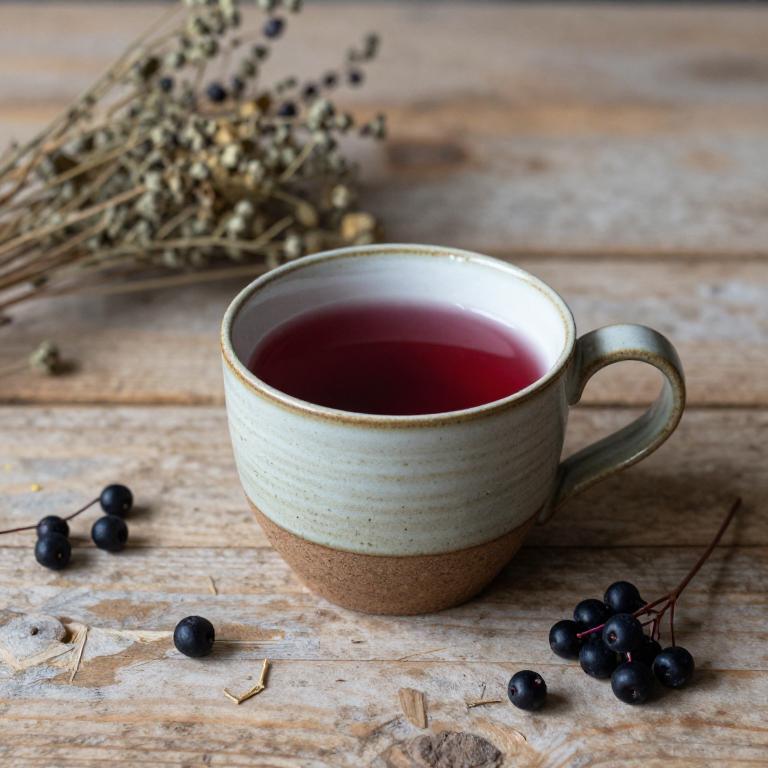10 Best Herbal Teas For Feverish Feeling

Herbal teas can be a natural and soothing remedy for a feverish feeling, offering gentle relief without the side effects of pharmaceutical medications.
Teas made from ingredients like peppermint, ginger, and lemon balm are commonly used to reduce body temperature and ease symptoms of mild fever. These herbs contain compounds that may help regulate body heat and promote perspiration, aiding in the body's natural cooling process. Additionally, herbal teas can help hydrate the body and soothe the throat, which is often irritated during a fever.
However, it's important to consult a healthcare professional if the fever is high or persistent, as herbal remedies should not replace professional medical care.
Table of Contents
- 1. Rosemary (Rosmarinus officinalis)
- 2. Echinacea (Echinacea purpurea)
- 3. Salvia (Salvia officinalis)
- 4. Stinging nettle (Urtica dioica)
- 5. Black elderberry (Sambucus nigra)
- 6. Ceylon cinnamon (Cinnamomum verum)
- 7. Thyme (Thymus vulgaris)
- 8. Licorice (Glycyrrhiza glabra)
- 9. Peppermint (Mentha piperita)
- 10. Chamomile (Matricaria chamomilla)
1. Rosemary (Rosmarinus officinalis)

Rosmarinus officinalis, commonly known as rosemary, is a fragrant herb often used in herbal teas to help alleviate symptoms of a feverish feeling.
Its essential oils, particularly cineole and camphor, have been traditionally valued for their antiseptic and anti-inflammatory properties, which may help reduce body heat and promote a cooling effect. When brewed into a tea, rosemary can support the body’s natural detoxification processes and enhance circulation, aiding in the relief of mild feverish sensations. However, it is important to note that rosemary tea should not replace professional medical advice, especially for persistent or high fevers.
As with any herbal remedy, it is best to consult a healthcare provider before use, particularly for individuals with existing health conditions or those taking medications.
2. Echinacea (Echinacea purpurea)

Echinacea purpurea, commonly known as purple coneflower, is a popular herbal remedy often used to support immune function and alleviate symptoms associated with colds and flu.
When brewed into a tea, it may help reduce feverish feelings by promoting sweating and supporting the body's natural detoxification processes. However, it is important to note that echinacea is not a substitute for medical treatment and should not be used as the sole remedy for high fever or severe illness. The tea is generally considered safe for most adults when consumed in moderate amounts, though it may cause mild side effects such as stomach upset in some individuals.
As with any herbal remedy, it is advisable to consult with a healthcare professional before use, especially for those with allergies or chronic health conditions.
3. Salvia (Salvia officinalis)

Salvia officinalis, commonly known as sage, has been traditionally used in herbal teas to alleviate a feverish feeling due to its antiseptic and astringent properties.
The plant contains compounds like thujone and cineole, which may help reduce inflammation and lower body temperature. Sage tea is often prepared by steeping fresh or dried leaves in hot water, and it is believed to support the body's natural cooling processes. While it may offer some relief, it is important to consult a healthcare professional if fever persists, as it could indicate a more serious underlying condition.
Overall, sage tea can be a soothing and natural option for managing mild feverish symptoms when used appropriately.
4. Stinging nettle (Urtica dioica)

Urtica dioica, commonly known as stinging nettle, is a herbal plant that has been traditionally used for its medicinal properties, including its potential to alleviate a feverish feeling.
When prepared as a herbal tea, stinging nettle is believed to support the body's natural detoxification processes, which may help reduce internal heat and inflammation associated with fever. The tea is rich in minerals such as iron, calcium, and magnesium, which can help boost energy levels and support overall immune function during periods of illness. However, it is important to note that while some people find relief from fever symptoms using stinging nettle tea, it should not replace professional medical advice, especially for persistent or high fevers.
As with any herbal remedy, it is advisable to consult with a healthcare provider before use, particularly for those with existing health conditions or who are taking medications.
5. Black elderberry (Sambucus nigra)

Sambucus nigra, commonly known as elderberry, is often used in herbal teas to help alleviate a feverish feeling due to its rich content of antioxidants and anti-inflammatory compounds.
These teas are believed to support the immune system and may help reduce symptoms associated with colds and flu, which often accompany a fever. The berries are typically dried and brewed into a soothing tea, which can be consumed warm to promote comfort and ease congestion. While not a substitute for medical treatment, elderberry tea is a popular natural remedy for managing mild feverish sensations.
However, it is important to consult a healthcare professional before use, especially for those with underlying health conditions or during pregnancy.
6. Ceylon cinnamon (Cinnamomum verum)

Cinnamomum verum, commonly known as true cinnamon, is often used in herbal teas to alleviate a feverish feeling due to its warming properties and anti-inflammatory effects.
The essential oils in cinnamon, particularly cinnamaldehyde, help to stimulate circulation and may reduce body temperature by promoting sweating. When brewed into a tea, cinnamon can provide a soothing and aromatic drink that supports the body’s natural cooling process. It is often combined with other herbs like ginger or peppermint to enhance its fever-reducing properties.
However, it is important to consult a healthcare provider before using cinnamon tea for persistent or high fever, as it may interact with certain medications or conditions.
7. Thyme (Thymus vulgaris)

Thymus vulgaris, commonly known as thyme, is a popular herb used in herbal teas to alleviate symptoms associated with a feverish feeling.
The tea is valued for its warming properties and ability to support the body's natural defenses against mild infections. It contains essential oils like thymol, which have antimicrobial and antiviral properties, helping to reduce fever and soothe respiratory discomfort. Drinking thyme tea can promote sweating, which may help lower body temperature and ease the sensation of being feverish.
However, it is advisable to consult a healthcare professional before using thyme tea, especially for those with chronic health conditions or during pregnancy.
8. Licorice (Glycyrrhiza glabra)

Glycyrrhiza glabra, commonly known as licorice root, has been traditionally used in herbal teas to help alleviate a feverish feeling due to its mild antipyretic properties.
The root contains compounds like glycyrrhizin, which may help reduce inflammation and support the body's immune response during mild fevers. When brewed into a tea, licorice root can soothe the throat and provide a warming effect, which may help ease discomfort associated with fever. However, it is important to use licorice root in moderation, as excessive consumption can lead to side effects such as high blood pressure.
As with any herbal remedy, it is advisable to consult a healthcare professional before using licorice root for feverish symptoms, especially for those with pre-existing health conditions.
9. Peppermint (Mentha piperita)

Mentha piperita, commonly known as peppermint, is a popular herb used in herbal teas to alleviate a feverish feeling due to its cooling and soothing properties.
The essential oils in peppermint, particularly menthol, help to reduce body temperature and provide a refreshing sensation that can ease the discomfort associated with a fever. Peppermint tea is often recommended for its ability to promote sweating, which can aid in lowering body heat and supporting the body’s natural cooling processes. It also helps to relieve headaches and body aches that often accompany a fever, making it a comforting remedy.
However, it is important to consult a healthcare professional before using peppermint tea, especially for children or individuals with certain medical conditions.
10. Chamomile (Matricaria chamomilla)

Matricaria chamomilla, commonly known as chamomile, is a popular herbal tea often used for its calming and soothing properties.
It is particularly beneficial for individuals experiencing a feverish feeling due to its mild antipyretic and anti-inflammatory effects. The tea contains compounds like apigenin, which may help reduce body temperature and alleviate symptoms of mild fever. Chamomile also promotes relaxation and can ease restlessness associated with fever, making it a gentle remedy for those seeking natural relief.
However, it is advisable to consult a healthcare professional before using chamomile tea, especially for prolonged or high fever, to ensure it is appropriate for the individual's condition.